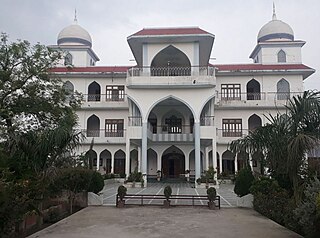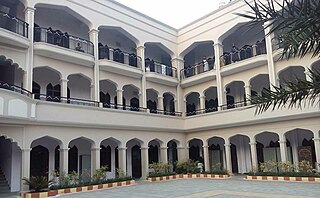
Anwar Shah Kashmiri was an Islamic scholar from Kashmir in the early twentieth century, best known for his expertise in the study of hadith, a strong memory, and a unique approach to interpreting traditions, as well as the fourth principal of Darul Uloom Deoband. With an ancestral heritage of religious scholarship rooted in Baghdad, he acquired training in Islamic sciences at Darul Uloom Deoband under the mentorship of Mahmud Hasan Deobandi, alongside enjoying a spiritual journey with Rashid Ahmad Gangohi. Initiating his vocation as the first principal of Madrasa Aminia, he embarked on a hajj in 1906 with a sojourn in Medina, dedicated to exploring the depths of hadith literature. Subsequently, he joined Darul Uloom Deoband, serving as the post of Sheikh al-Hadith for nearly thirteen years before choosing Jamia Islamia Talimuddin as his final destination for his academic voyage. Although he displayed limited inclination toward the written word, a handful of treatises flowed from his pen. Yet, the bulk of his literary legacy has been preserved through the efforts of his students, who transcribed his classroom lectures, discourses, and sermons. While the crux of his scholarly work centered on championing the Hanafi school and establishing its supremacy, he also garnered recognition for his comparatively liberal approach to various religious matters. His publications found their place under the patronage of Majlis-i Ilmi, a scholarly institution established in Delhi in 1929. His scholarly credentials received official endorsement with the publication of Fayd al-Bari, a four-volume Arabic commentary on Sahih al-Bukhari, curated by Badre Alam Merathi and published in Cairo, with the financial support of Jamiatul Ulama Transvaal.
Muhammad Tayyib Qasmi was an Indian Sunni Islamic scholar who served as Vice Chancellor of Darul Uloom Deoband for more than half a century. He was grandson of Muhammad Qasim Nanautavi, the founder of the Darul Uloom Deoband.
Fuzail Ahmad Nāsirī is an Indian Deobandi Islamic scholar, Urdu writer and poet, who is a professor of hadith and vice-administrator of education at the Jamia Imam Muhammad Anwar Shah. He is an alumnus of Darul Uloom Deoband. His books include Hadīth-e-Ambar, Tafhīm-e-Ilhāmi and Tafhīm-ul-Maybzi. He has taught at Darul Uloom Azizia in Mira Road, Jamia Darul Quran in Sarkhej and Madrasa Faizan-ul-Quran in Saraspur. He is a recipient of Allama Iqbal Award.
Muhammad Miyan Deobandi was an Indian Sunni Islamic scholar, academic, historian, freedom struggle activist, who served as the fifth general secretary of the Jamiat Ulama-e-Hind. He wrote books such as Aseeraan-e-Malta, Ulama-e-Hind Ka Shaandar Maazi and Ulama-e-Haqq Aur Unke Mujahidana Karname.
Izaz Ali Amrohi was an Indian Islamic scholar who served as the second and ninth Grand Mufti of the Darul Uloom Deoband. His book Nafahtul Arab is taught in madrassas including the Darul Uloom Deoband.

Jamia Imam Muhammad Anwar Shah is an Islamic seminary situated in Deoband, Saharanpur, Uttar Pradesh.

Al-Jamia Al-Islamia Darul Uloom Waqf Deoband is an Islamic seminary situated in the Indian town of Deoband. It was established by scholars led by Muhammad Salim Qasmi and Anzar Shah Kashmiri in 1982 as a result of administration disputes in Darul Uloom Deoband during 1980–1982. As of 2021, Muhammad Sufyan Qasmi is its rector.

Madrassa Shahi is an Islamic seminary in Moradabad, Uttar Pradesh. It was established in 1879 by the poor Muslims of Moradabad under the supervision of Islamic scholar, Muhammad Qasim Nanautawi, who also established the Darul Uloom Deoband. This started as Madrasatul Ghuraba, but gained recognition as Madrasa Shahi. Its first principal was Ahmad Hasan Amrohi.

Muhammad Salim Qasmi Siddiqi was an Indian Muslim scholar who co-founded the Darul Uloom Waqf in Deoband and served as its first rector. He was an alumnus of Darul Uloom Deoband. He received the fourth Shah Waliullah Award and was honoured with the Mark of Distinction from Egypt.
Saeed Ahmad Akbarabadi was an Indian Islamic scholar and an Urdu-language author who co-founded the Nadwatul Musannifeen. He served as the dean of the Faculty of Theology in Aligarh Muslim University.

Azhar Shah Qaiser (1920–1985) was an Indian Islamic scholar, journalist and writer. He wrote articles and books in Urdu. He was the elder son of the Indian hadith scholar, Anwar Shah Kashmiri. During his career, he served as the editor of Monthly Darul Uloom, the monthly journal of Darul Uloom Deoband.
Aziz-ul-Rahman Usmani was an Indian Sunni Muslim scholar who served as first Grand Mufti of Darul Uloom Deoband. He is best known for his Fatawa Darul Uloom Deoband. His brother was Shabbir Ahmad Usmani.
Hāmid al-Ansāri Ghāzi was an Indian Muslim scholar, author and a journalist, who co-founded the Nadwatul Musannifeen and served as the editor of bi-weekly newspaper Madina. He was the son of Muhammad Mian Mansoor Ansari and an alumnus of the Darul Uloom Deoband, Jamia Islamia Talimuddin and University of the Punjab. He was a member of the executive council of Darul Uloom Deoband and authored books such as Islām ka Nizām-e-Hukūmat and Khulq-e-Azeem.

Ghulam Nabi Kashmiri was a Kashmiri Muslim scholar and jurist who served as the senior professor of hadith at Darul Uloom Waqf. He also taught hadith at Jamia Ziya al-Uloom and Jamiat al-Tayyibat in Poonch. He was among the early graduates of Darul Uloom Waqf and authored books such as Hayat-e-Tayyib, a biography of Muhammad Tayyib Qasmi.
Nizamuddin Azami was an Islamic scholar who served as the twelfth and last Grand Mufti of Darul Uloom Deoband. He made contributions in Islamic jurisprudence, and his works include Muntakhabat-e-Nizām al-Fatāwa, a collection of selected fatwas he wrote during his tenure at Deoband.
Badre Alam Merathi was a mid-twentieth-century hadith scholar and poet originally from Meerut, initially migrated to Pakistan and eventually settled in Medina. Best known as the interpreter of Anwar Shah Kashmiri's teachings, he was a disciple of both Kashmiri and Shabbir Ahmad Usmani. Educated at Mazahir Uloom and Darul Uloom Deoband, he taught at both institutions and Jamia Islamia Talimuddin. During his tenure at Jamia Islamia Talimuddin, he compiled Fayd al-Bari, a four-volume Arabic commentary on Sahih al-Bukhari, published in Cairo with financial support from Jamiatul Ulama Transvaal, considered a masterpiece in hadith commentary. He was also associated with Nadwatul Musannifeen and authored Tarjuman al-Sunnah, a 4-volume hadith explanation designed for contemporary needs, widely acknowledged in academic circles. In his final years, he focused on teaching hadith in Prophet's Mosque, where many South Africans pledged allegiance to him, expanding his spiritual influence in South Africa.
Mahdi Hasan Shahjahanpuri (1882–1976), also known as Mufti Mehdi Hasan and Mahdi Hasan Gilani Qadri, was an Indian Islamic scholar and mufti. He served as grand mufti at Darul Uloom Deoband for twenty years. He was an alumnus of Madrasa Aminia and Darul Uloom Deoband. He was a student of Mahmud Hasan Deobandi and Kifayatullah Dehlawi. Along with jurisprudence, he also had access to hadith and biographical evaluation. His literary works include Rijāl-u-Kitāb al-Āthār, Sharh-u-Balāghāt-i-Muhammad Fī Kitāb al-Āthār, Al-la'ali al-Masnoo'ah fī al-Riwāyāti al-Marjoo'ah, and a critical commentary on certain ideas of Ibn Hazm in the Science of Hadith entitled As-Sayf al-mujalla 'ala al-Muḥalla. He has done research and commentary work on Muhammad al-Shaybani's two books, Kitab al-Hujjah Alā Ahl al-Madīnah and Kitab al-Āthār.
Habibur Rahman Usmani (1860–1929), also written as Habibur Rahman Deobandi and Maulāna Habib al-Rahmān, was an Indian Islamic scholar, Arabic writer and poet, and an Islamic jurist. He served as Deputy Vice-Chancellor, then Vice-Chancellor for the VC Office of Darul Uloom Deoband, for nearly twenty-three years. He succeeded Hafiz Muhammad Ahmad as Grand Mufti of Hyderabad State for about one year. His students included Shabbir Ahmad Usmani, Manazir Ahsan Gilani, Muhammad Shafi Deobandi, Habib al-Rahman al-A'zami, Muhammad Idris Kandhlawi, Atiqur Rahman Usmani, Qari Muhammad Tayyib, Badre Alam Merathi, Hifzur Rahman Seoharwi, Saeed Ahmad Akbarabadi, Manzoor Nomani, and Yusuf Banuri.
Ghulām Rasool Hazārvi was an Indian Islamic scholar and one of the earliest teachers of Darul Uloom Deoband. He served as a teacher in Darul Uloom Deoband for about thirty one years. His teachers included Syed Ahmad Dehlavi and Mahmud Hasan Deobandi. His students included Abdur Rahim Popalzai, Anwar Shah Kashmiri, Asghar Hussain Deobandi, Hussain Ahmad Madani, Izaz Ali Amrohi, Kifayatullah Dehlawi, Manazir Ahsan Gilani, Muhammad Sahool Bhagalpuri, Muhammad Tayyib Qasmi, and Shabbir Ahmad Usmani.








